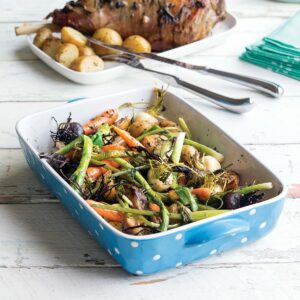
The low-FODMAP diet is complex, and misinformation from the internet can create even more confusion. So, can you tell your FODMAP facts from fiction?
Myth 1: The low-FODMAP diet is a forever diet
Don’t be fooled by the misinformation out there. The strict elimination phase of the low-FODMAP diet only lasts for two to six weeks1 2. Once you gain good symptom control you can start testing each FODMAP group and reintroducing foods back into your diet 1 2. Long term you will transition onto a modified low-FODMAP diet, which allows you to enjoy some high-FODMAP foods, while keeping good symptom control.
Myth 2: You can cook with high-FODMAP ingredients and just remove them
FODMAPs are water soluble. This means you can’t just pick those onion and garlic pieces out of your soup, as the FODMAPs have already leached into your meal3. The safest way to ensure your meal is low FODMAP is to only use low-FODMAP ingredients when you cook. There is one exception to this myth. Garlic and onion-infused oils are low FODMAP. This means you can fry onion or garlic in oil for 2 to 3 minutes to infuse the flavours. The FODMAPs can’t leach into the oil (as there is no water content), so you capture the flavour without the FODMAPs3. Just remember that you must remove the onion or garlic pieces before adding other ingredients.
Myth 3: The FODMAP diet is a dairy-free diet
This is a myth! You don’t have to give up dairy while on the low-FODMAP diet. The ‘D’ in FODMAP stands for disaccharide and represents lactose, which is found in cow’s milk. Normal cow’s milk and normal yoghurt are high FODMAP, but you can still enjoy lactose free cow’s milk, hard cheeses, butter and lactose-free yoghurt, as these contain no lactose or very low levels of lactose4.
Myth 4: You have to cook separate meals for you and your family
Cooking for your family after a hard day at work is challenging enough, and there is no need to make yourself more work by cooking different meals. It is safe for your family to share one low-FODMAP meal per day, providing other family members are still eating high-FODMAP foods. Stock the kitchen with some high-FODMAP foods such as apples, pears, stone fruit, or muesli bars for snacks, normal milk for breakfast, and wheat bread for sandwiches to keep other family members happy. If you need help finding family-friendly dinner recipes, then make sure you check out my low-FODMAP meal planning service.
Myth 5: The low-FODMAP diet is gluten free
This one is a tad confusing as gluten-free products are often recommended for this diet. Let’s take a closer look. Gluten is the protein found in wheat, rye and barley endosperm, while FODMAPs are carbohydrates4. It is often the oligosaccharides in the wheat, rye and barley that cause our digestive issues, not the gluten4. Just remember you’re not limiting the gluten, instead you are reducing the amount of fructans you are eating.
Gluten-free products are recommended as they help remove several major sources of FODMAPs from our diet. Don’t be caught out though, not all gluten-free products are low FODMAP. Check each product for sneaky FODMAPs like inulin, chicory root fibre, apple fibre, date puree, honey, high fructose corn syrup, apple juice, pear juice, or fruit juice concentrates. Keep in mind that small amounts of wheat are allowed during the elimination phase – you just need to watch your portion sizes. Check your low-FODMAP app to find out more.
Article sources and references
- Varney, J. 2015. Low FODMAP diet – not a ‘lifetime’ diet. Monash Low FODMAP Bloghttp://fodmapmonash.blogspot.co.nz/2015/04/low-fodmap-diet-not-lifetime-diet.html/
- Barrett, J & Tuck, C. 2015. Just 2-6 weeks, it is not a STRICT diet for life. Monash Low FODMAP Bloghttp://fodmapmonash.blogspot.co.nz/2015/06/just-2-6-weeks-it-is-not-diet-for-life_8.html/
- Tuck, C. 2015. Cooking with onion and garlic – myths and facts. Monash Low FODMAP Bloghttp://fodmapmonash.blogspot.co.nz/2015/06/cooking-with-onion-and-garlic-myths-and.html/
- Monash FODMAP App. 2017. About Section & Food Guide. Monash FODMAP App: version 2.0.3 (326).https://www.monashfodmap.com/ibs-central/i-have-ibs/get-the-app/
www.healthyfood.com











